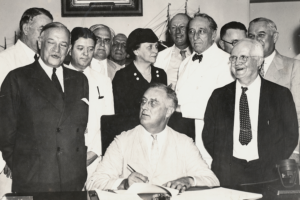Panic over the impact on German savers of low interest rates and looming inflation neglects to mention that very few Germans are saving much
The German saver is suffering! The European Central Bank ought to make policy for the Germans again! That naughty Mario Draghi; those poor Germans! Maybe we should just exit the EU; it’s en vogue at the moment, after all.
Thus the lamentations sparked by interest rates on savings dropping to zero, and news that inflation is coming.
Of course, there are now Germans who have more debt than savings. They won’t have to suffer too badly, of course. On, the contrary, they may even be glad to (with a bit of luck) actually pay significantly less interest than in the past on their credit, while at the same time the value of their debt diminishes due to inflation. According to estimates by the German Institute for Economic Research (DIW), this applies to no less than every fourteenth adult. They have “negative assets”, which clearly sounds better than to have debt.
Admittedly, a relatively laid-back reaction to the vanishing of rewards for saving their money can be expected from citizens with no assets whatsoever — after quite a few years of loss in real income, they simply have no money to put in the bank at the end of the month. According to DIW statistical evaluations, this is the case for at least another 20 percent of the country’s population. Add it together with the “negative asset” holders, and you have almost 30 percent of the population.
If to that 30 percent we add those that now and again transfer a few euros but nothing really substantial to their savings account, we arrive at roughly 50 percent of Germany’s population to whom it essentially makes little to no difference whether any particular interest is now set at zero percent or some non-zero percent. The savings of half of Germany’s households amount to less than €17,000.
Then there is the other half. Are they suffering? To be fair, one has to subtract those from the list of sufferers who have enough money available so that they are not checking their savings accounts nervously all day long, but have invested a good amount of their dough in stocks or bought this or that little piece of property. To put it in figures, of the 25 percent who possess more than €100,000 beyond their requirements for living (a group that owns, easily, 90 percent of all assets in the country), there should only be a few nitwits who have deposited all their dear money at a savings bank. This group should be relatively at ease with the audacious zero interest rate, especially when taking into account that zero interest rates have greatly contributed to an almost 150 percent surge of the German stock index DAX since the beginning of 2009.
Note: According to DIW economist Markus Grabka, about two-thirds of the total assets in the country are tied up in real estate. A similar logic is at work here. Again, zero interest rates, if they had an impact at all, brought about a rather miraculous effect by significantly boosting property values. The term “suffering saver” hardly applies to this well-off group of German citizens.
Roughly calculated, the real sufferers add up to a quarter of the country’s population. They are those citizens who are neither indebted, nor have any accumulated capital yet — or too little to deposit in a lousy-interest-paying savings account or invest in government bonds.
The do-gooders like to fight for minorities, and in the case, those suffering from low interest rates are also a minority — but well-off one.
And we haven’t yet covered all the facts. A recent calculation by the Bundesbank reveals that without such extremely low interest rates since the outbreak of the financial crisis, the local treasurers from the federal, state and local governments would have had to pay €240b more to cover the interest on our national debt. Which means that our German finance minister Wolfgang Schaeuble would never have achieved the “black zero” in balancing the federal government budget – a dreadful thought – or otherwise would have had to raise taxes to achieve this goal.
There’s a good chance that if we’d had higher interest rates, we would not have nearly as many savers today. After all, it is with good reason that clever economists point out that not cutting interest rates during a similar crisis in the 1930s contributed significantly to the escalation of the economic crisis, including mass unemployment and impoverishment. When a major financial bubble bursts, lower interest rates can help ward off a dangerous wave of bankruptcies. And where investment is scarce, interest rates are low anyway. In the end then, it is good for everyone that interest rates are so low — even for the savers. Those who end up on the street won’t have anything to save anyway. Let’s rather save at zero percent interest rate. Thank you, Draghi.
That being said, the next question is whether the money mobilized by the central banks should go directly to households instead of to wealthy stock and real-estate investors. However, this is another topic. At this point the world truly has much more urgent problems to deal with.
Translated from German. Originally posted in Spiegel Online on Friday, February 3






